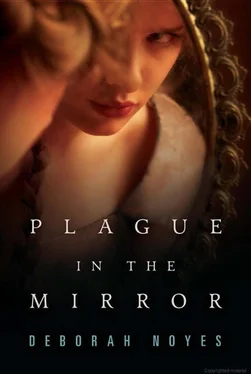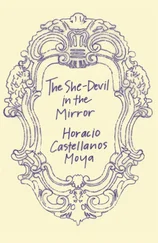May tries to play along, but it’s more of an effort than usual. “And we’re really too old for camp?”
“I’ve been thus informed.”
“Why didn’t you stay home and work?” she asks seriously. “You’re moving out in the fall anyway.”
“Mom’s on sabbatical. You know what that means. She sublet the house. Home’s on wheels with her, always has been.” He meets her eyes intently for the first time all day. “Are you OK?”
She’s never thought much about Liam’s eyes, which would be like thinking about a zebra’s stripes. It’s inconvenient, in a way, to notice them now, but they’re a shocking blue. She glares at him.
“OK. It’s lame and sentimental,” he says — circling back now, aware that he’s pushed too hard — that May isn’t ready to talk about her family or the lack. “I guess I came because this might be the last time I get to really hang with my mom… and now you… before college. Even if it means I have to spend all summer in cathedrals.” They both look up at the vast structure in front of them. “You’re getting a stipend, at least. I’m doing this for free.”
“Sucker,” she jokes, because that’s what they do — joke, soothe, smooth it over, whatever it happens to be — but May is relieved when Gwen returns, jittery with excitement.
“I’ve found something.” She waves them off the steps, her voice soft, urgent. “Come, come. Quickly.”
Liam groans, heaving himself up and startling a pigeon pecking on the curb nearby.
Gwen’s long gray-white hair swings with her purposeful stride, and they follow past the office of the Misericordia to a narrow alley leading away from Piazza del Duomo toward Via dei Calzaioli. The fleeting daylight barely touches it. “It’s called Via della Morte.” She stops short. “Way of Death.” Gwen runs her finger over a plaque, paraphrasing in that clipped, breathless way that pays homage to their joint minuscule attention span. “Around 1343, Ginevra, a daughter of the noble house of Amieri, fell in love with a young man from an unsuitable family in an opposing order. Her father forbade their marriage and made her marry a man named Francesco Agolanti instead, who was of equal birth. During a rash of plague, she took sick and seemed dead, so her husband buried her in the family vault in that cemetery between the cathedral and the campanile. In the middle of the night, Ginevra came to in a panic, terrified. She managed to unwind her bandages, raise the stone slab, flee from the vault, and return to her husband’s home along this alleyway.”
Gwen regards them with wide eyes, turning to the plaque again. “When Ginevra knocked, Agolanti was understandably shocked and took her for a vagrant spirit, barring the way, so she hurried to her father’s house in the Mercato Vecchio, where she was also rejected. Finally she tried the home of her true love, young Rondinelli, and was received by his parents. Her marriage to Agolanti was annulled, and she was able to marry Rondinelli at last.”
This is the kind of morbid-romantic anecdote that excites Gwen beyond all reason. She already has her camera out and is trying to get an atmospheric shot of the alleyway before the light goes.
Unimpressed, May and Liam linger with their backs to stone.
“Yay for plague,” Liam offers. “I love a happy ending.”
“True,” Gwen agrees absently, framing another shot. “It’s a bit like Romeo and Juliet — only with a better outcome.”
Intervention is the trick with her, so after conferring behind her back, May and Liam wait for Gwen to let the camera rest on its strap around her neck; then they link arms with her, steering her gently out of the alley and into the waning sunlight of the piazza.
“You guys really cramp my style sometimes,” she complains, laughing. “Listen. You haven’t exactly worked hard yet, but why don’t you take tomorrow off? We’ll give each other a break. But only if you track down those photo permissions I asked for. This week. And, May, I’ll need at least an outline for one of the three papers you’re writing this summer. Also this week. Time management, dearest.”
May nods.
“What’ll you be up to?” Liam asks as they walk. It’s sweet, in a way, how he’s so protective of his mom. May supposes he’s always been that way, at least since his dad left. It’s just more noticeable here.
“I have an appointment at U-Florence. An old friend was on a team that recently exhumed a skeleton from a mass grave in Venice. They’re claiming it’s the first evidence of the vampires mentioned in contemporary documents.
“This is related to our friend Ginevra,” Gwen continues, “in a way. The focus of the dig was mass graves of plague victims on Lazzaretto Nuovo Island. Around the time this woman died, in the Middle Ages, people believed plague was spread by what they called vampires. Not the bloodsucking kind. These spread disease by chewing their way out of their shrouds after they died, so grave diggers muzzled suspects with a sort of brick. The skeleton my friend found had a stone slab in its mouth.”
“How’d they get the vampire idea?”
“I guess blood sometimes leaked from a corpse’s mouth, causing the shroud to sink in and tear. U-Florence says this is the first forensic example of these so-called vampires. It’s being contested, of course. Another archaeologist claims to have made a similar find in Poland.”
“Battle of the archaeologists,” quips Liam, rolling his eyes, and May tries to smile back.
Glancing vaguely down another twisting alleyway of stone and shadows, she thinks how strange it is that such a sunny country, with more tourists and flavors of ice cream than seem possible in one universe, has such an old, dark heart.
At dinner it takes a while to find a trattoria, osteria, or ristorante — all basically the same thing, Gwen allows — serving anything remotely vegetarian. Tuscans love their meat, their tripe and wild boar and liver and sausage, and May has a feeling she’s going to be eating a lot of white beans in tomato sauce for the next few months. Thank God for olives, she thinks, which is funny. As the child of confirmed agnostics, she isn’t one to contemplate God, but in Florence, images of sinners and saints are everywhere, and heaven and hell look like very real places.
They focus intently on their food, not talking much over dinner. The outdoor tables were all taken when they arrived, but they scored a window seat and everyone seems lost in their own thoughts and flavors, content to half listen to the accordion-and-clarinet music out in the piazza or the warm murmur of Italian, English, German, and Japanese conversation at the tiny tables crowded into a dim dining room. But Liam finally speaks, suggesting they head up to Fiesole tomorrow, walk around the ruins that Gwen mentioned on the walk over. “I know it’s only been a day, but I’m already up for some green. That B&B spoiled me.”
May meets his eyes. “We’re like some old married couple,” she quips. “I was thinking that exact thing when we sat down to eat.”
“As long as you start on the permissions, I don’t mind where you go,” says Gwen. The sun has almost set, and the square swarms with tourists in shorts and fanny packs. Gwen points out a little procession of formally dressed locals — Italians, anyway — meandering in their direction along the piazza’s pedestrian zone. They approach in pairs or loose groups, the women impeccably made-up and holding their backs straight for smiling escorts. Not a few of the younger men strut solo in pointy shoes, but it’s all moving at a snail’s pace.
“Parade?” Li asks innocently enough, but an old man with chiseled cheeks, eavesdropping at the table behind them, tut-tuts.
Читать дальше












